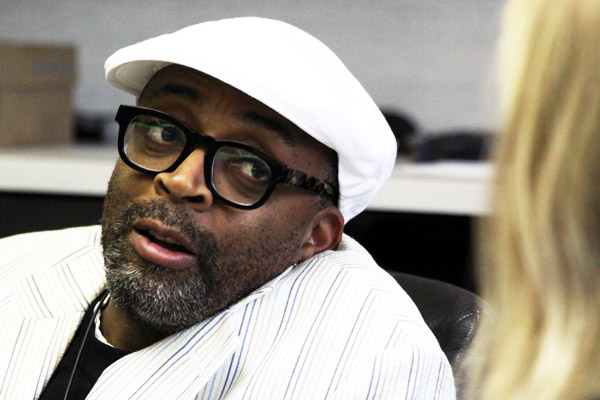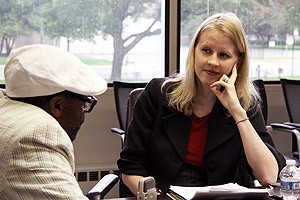
Filmmaker Spike Lee talks to Kartemquin Films's Executive Director Justine Nagan at the WGN-TV studios on August 8, 2012.
“If you want to be a great director, you have to be a great storyteller,” says the auteur filmmaker Spike Lee, whose new film, Red Hook Summer, the latest installation in his Brooklyn series, is released Friday. Lee began telling stories about his favorite New York borough in 1989 with Do The Right Thing. Twenty-three years later, Red Hook Summer, a coming-of-age movie about teenage Flik (Jules Brown) and his deeply religious grandfather, Bishop Enoch Rouse (Clarke Peters), explores similar themes of neighborhood life lived on blacktops, around dinner tables, and in churches. While Lee’s movies often are rooted in place, they also paint broader portraits of the urban ecosystem—be it New York, New Orleans, or here. So we invited Justine Nagan, executive director at Chicago-based Kartemquin Films (Hoop Dreams, The Interrupters), to join Lee in conversation. Read some highlights of their conversation, or listen to the entire interview—including Lee's thoughts on his infamous "dolly shot," Muhammad Ali, and his teenage children—below. —ELLY FISHMAN
Justine Nagan: For Kartemquin and for Steve James, Hoop Dreams is by far the biggest film we were ever involved with, even considering the recent success of The Interrupters. It's a good problem to have, but we like people to know our full body of work. Does that happen to you with Do the Right Thing?
Spike Lee: No. People love Crooklyn. A ton of people of people tell me they went to a historically black college because of School Daze. Malcolm X, Inside Man, they love Denzel and Ray Allen in He Got Game. They love the whole jazz thing we did in Mo' Better Blues… the documentaries of Four Little Girls and the two films I did about Katrina…. Not everyone references Do the Right Thing all the time.
JN: You've done films on big historical events, and then in your other films, there’s always these small details that set the time and place—and this film is no exception. I kept noticing them throughout Red Hook Summer, whether it was the problem of urban asthma, Obama and the stock market, or the iPad 2.
SL: That’s filmmaking. The devil's in the details. How can I teach my students at NYU that? They'd be looking at me crazy if I'm telling them to do all this shit, and then they look at my films and they don't see it? I gotta practice what I preach, what i'm trying to drill into their heads—their young, hard heads sometimes.
JN: Do you feel that a lot of mainstream images of African Americans can be very stereotyped?
SL: Well, I’m not going to say all Hollywood images are stereotypical. But in my opinion, I don’t think they show the breadth and depth of the African American experience as well as they could. But that’s the reason I financed this film myself, so the audience is given a choice to see something else.
JN: We’re trying to encourage filmmakers of color to get documentaries out there. Do you have any advice for young African Americans trying to make their way?
SL: Tell the story. Tell the story you’re trying to tell, and try to tell interesting stories in interesting new ways. If you want to be a great director, you have to be a great storyteller. It’s not just about angles and stuff. You need both… it’s a delicate balance.
 Kartemquin's Justine Nagan
Kartemquin's Justine Nagan
JN: Would you ever consider making a film in Chicago?
SL: Oh yeah, I’d love to make a feature film here. But the thing about filming today is if a state or city doesn't have a great, big tax refund…
JN: Which we do…
SL: Not like Louisiana. More films are shot now in Louisiana than in L.A. That's how studios determine where they're gonna shoot. I know for sure that people would love to shoot in Chicago, but when you add the numbers up, they say "We gotta go to Louisiana."
JN: A lot of your films deal with coming-of-age stories, kids turning into adults, whether it’s Jesus in He Got Game or Flik in Red Hook Summer. What attracts you to those stories?
SL: I don’t know. Maybe it's a subconscious thing, but when I start to write those stories, I don’t say, "Now I want to do a coming-of-age thing." For this one, James McBride [co-writer] and I both have teenage kids, and we wanted to see some contemporary teenage kids in the movie.
JN: I have a new baby, a six-month-old boy, and watching the story with Flik and his mom sending him off, the new mom in me added an extra level of stress.
SL: You have to cut the umbilical cord. Just start priming yourself. Just make sure your son makes the right decisions. They’re going to fly the coop. And sometimes, you want them to leave sooner than they want to.
Photograph: Esther Kang


